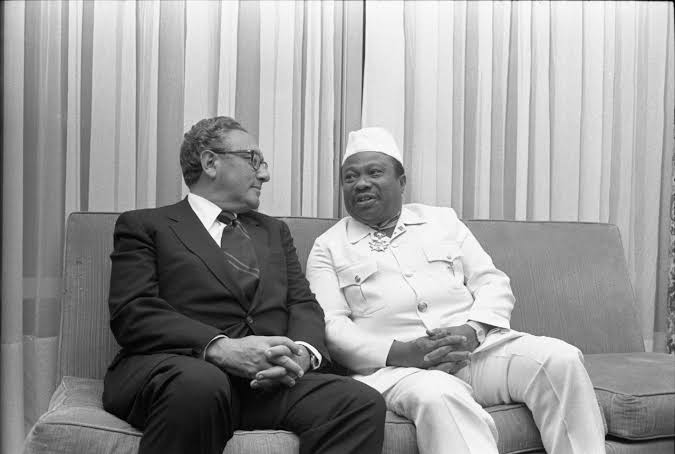Henry Kissinger Through the eyes of an African
By Femi Olugbile
A few days ago, the world woke up to the news that Henry Kissinger, America’s Rock star politician who bestrode world affairs like a veritable colossus for several years, was dead. It felt rather odd for the world to wake up to a day without Henry Kissinger.
Henry Alfred Kissinger was born on the 27th of May 1923 in Germany. He emigrated to the USA in 1938 as a Jewish refugee fleeing from the Nazis.
After the war, he was admitted to Harvard University, where he studied and subsequently worked, becoming a professor of Government. He acquired fame as an expert on Foreign Policy and nuclear weapons.
He served as the National Security Advisor to the government of President Richard Nixon, and subsequently Gerald Ford, from 1969 to 1975. In September 1973, he was appointed Secretary of State, a position he held up till January 1977.
The ’Kissinger Years’ were watershed years in the politics and international affairs of different regions of the world, and the portly bespectacled figure of Henry Kissinger always seemed to be in the middle of the action, and on the front pages of newspapers. New words, or old words employed in new ways, were added to the lexicon of international discourse, and they all seemed to have been invented to describe Kissinger’s day to day life, as he hopped from place to place, seeming to live semi-permanently out of a suitcase and a on a jet plane that was always ready to take off to some distant location. In the official version of the history of the era, Kissinger pioneered détente with the Soviet Union during the Cold War. He facilitated the opening of relations with China and engaged in endless ‘shuttle diplomacy’ in the Middle East to end war between Israel and the Arab nations. He negotiated the Paris Peace Accords which ended the American involvement in war in Vietnam and earned a Nobel Prize for his efforts.
When viewed through the prism of this narrative, which has been endlessly regurgitated in the world’s media, it is easy to see the man as he wanted to be seen – the consummate statesman of the age, the idealist who used his energy and intellectual power to guide two American Presidents and shape world affairs for the benefit of the United States of America.
But, of course, even the lexicon associated with Kissinger himself gave the lie to this sort of goody-goody high-minded image. America had lost the Vietnam war anyway, so the Nobel Prize was a fraudulent contraption to soothe America’s, and Kissinger’s, ego. The word Realpolitik – which conjures up an unvarnished worldview where people and nations are dealt with, not as they ought to be, but as they are, warts-and-all, was proudly flaunted by Kissinger’s American strategy. It led to unquestioning support for murderous dictators in Latin America and elsewhere, such as Augusto Pinochet of Chile, and the propping up of quisling regimes that made no pretensions to being representatives of their people on different continents. That Mobutu Sese Seko was the only black African leader for whom Kissinger deigned to show any personal regard spoke volumes about his view of Africa and Africans.
Africa featured very little in the thinking of America during the eras of Presidents Nixon and Gerald Ford, and Kissinger gave scant attention to anyone on the continent, other than the whites in South Africa, and Rhodesia. Things changed dramatically after the coup in Portugal in 1974 when that small European country, bleeding from protracted insurgencies in its African colonies of Angola and Mozabimque, decided to cut its losses and go home. A civil war ensued in Angola between the left leaning liberation movement MPLA and a right-wing, Western-supported UNITA. Before an OAU meeting scheduled for Addis Ababa in 1976, the American envoy in Lagos, in a move bearing the imprimatur of Henry Kissinger, delivered a letter to Dodan Barracks, advising the incumbent Nigerian leader General Murtala Mohammed to vote to support UNITA in Addis Ababa. Murtala was chagrined.
This started off a chain of actions that led to the Nigerian leader’s immortal ‘Africa has come of age..’ speech in Addis Ababa, which has earned him immortality as a pan-Africanist.
The speech offended President Ford and Secretary Kissinger. It also swung Africa behind MPLA and spelt doom for UNITA.
It was the beginning of the turn-around for the Liberation Wars in Southern Africa.
Kissinger had shortly before then confidently assured the American President that the white governments of Southern Africa were ‘here to stay’, and that the ragged ‘Soviet-sponsored’ African guerrilla movements represented no alternative to them.
Kissinger was billed to attend a meeting in Lagos. The meeting was cancelled by the Nigerian government. Murtala had been assassinated meanwhile, and General Obasanjo was in power. The Nigerian resolve on the South African issue had solidified.
Reacting pragmatically, Kissinger swallowed his words and embarked on a ‘Shuttle Mission’ to Southern Africa.
But he still didn’t get it. While he told a tearful Ian Smith that he would need to concede to majority rule in Rhodesia eventually, he was solidly behind the apartheid government of South Africa. This was despite the world-wide condemnation of the Boer-led government’s massacre of more than two hundred protesting students in Soweto, and a growing movement to boycott the country. The longest discussion he held with any black African leader was a seven-minute talk with Joshua Nkomo. When someone mentioned Robert Mugabe, he did not even recognise the name. Mandela, who was in prison on Robben Island, did not appear on the Kissinger radar.
It is not African to speak ill of the dead, but Kissinger was no shaper of African History, but an irrelevant footnote, as far as the continent was concerned.
Still, may his soul rest in peace.

